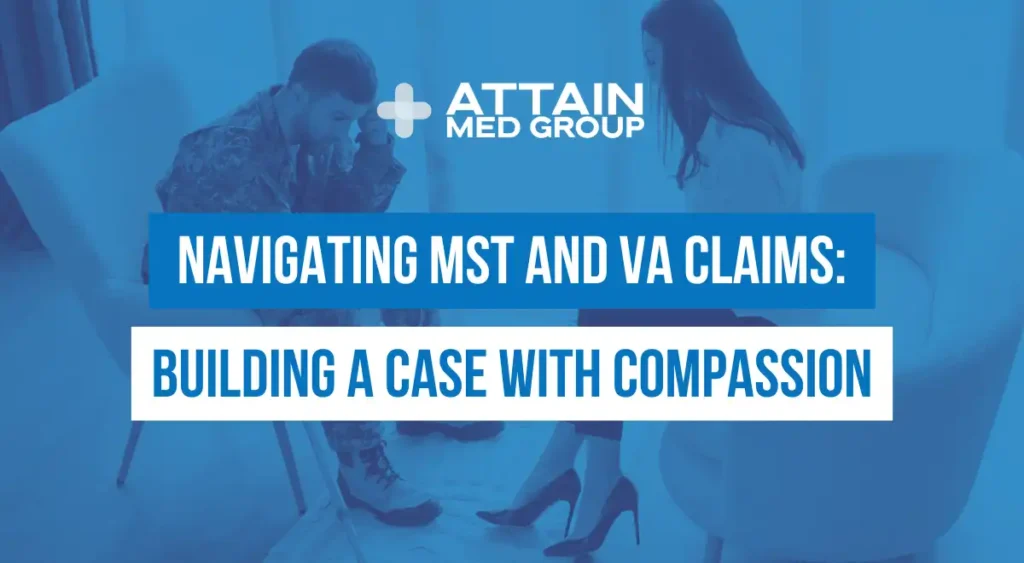If you’re reading this, you might be carrying a heavy weight. You might be a veteran who experienced something deeply damaging during your service. Understanding Military Sexual Trauma (MST) and VA Claims: Building a Case with Compassionate Evidence can feel like another mountain to climb, but you don’t have to do it by yourself. We see you, we hear you, and we want to help you understand how to approach this difficult process. This journey toward healing and getting the VA benefits you deserve is possible, and this information on Military Sexual Trauma (MST) and VA Claims: Building a Case with Compassionate Evidence aims to light the path for trauma survivors.
What Exactly is Military Sexual Trauma (MST)?
The term Military Sexual Trauma, or MST, is used by the Department of Veterans Affairs (VA) to refer to experiences of sexual assault or sexual harassment that occurred during military service. This is not a formal diagnosis like Post-Traumatic Stress Disorder (PTSD) or another stress disorder. It is an experience, a profoundly personal and often painful one, impacting many MST survivors.
MST encompasses any sexual activity where an individual is involved against their will. This could mean they were pressured into sexual acts, unable to consent due to intoxication or other incapacitation, or physically forced. The range of painful events includes unwanted touching, grabbing, coercive sexual behavior, and rape, all forms of sexual trauma.
It is vital to recognize that MST can affect any service member, irrespective of gender, age, rank, or branch of service; both men and women veterans can be victims. The defining factor is that the experience was sexual in nature and occurred during the period of active military duty. Many who experienced military sexual trauma face significant challenges afterward.
The impact of experiencing military sexual trauma can be far-reaching, affecting mental and physical well-being for years. Understanding the scope of what constitutes an MST experience is the first step in seeking help and benefits. The Veterans Affairs provides specific resources for those who have experienced MST.

Understanding VA Claims for MST
If you have developed physical or mental health conditions resulting from MST, you may be eligible for veteran disability benefits from the VA. The VA does not provide benefits for the MST incident itself but for the lasting conditions that arise from such traumatic stress. These health issues can manifest or worsen long after the trauma occurred.
Common conditions linked to an MST experience include Post-Traumatic Stress Disorder (PTSD), depression, anxiety disorders, and substance use disorders, which fall under psychiatric/mental health cases. Physical conditions like chronic pain, some gynecological issues, or even certain skin disabilities cases or neurological disorder symptoms can also stem from MST. The critical element is demonstrating to the VA that your current condition began or was aggravated due to the MST you experienced military sexual contact or activity during your service.
A significant number of MST survivors worry because they did not report the MST incident when it happened. The VA is aware of this reality. Many individuals do not report for valid reasons, including fear of retaliation, shame, or concerns about career impact. You can still file an MST claim, and there are established methods to build your case even without an official report in your service record.
These disability claims require careful preparation, and understanding the VA’s perspective on MST-related health cases is beneficial. Sometimes, these conditions can be so severe that they lead to claims for total disability individual unemployability (TDIU). If your MST experience has left you unable to work, this is an important avenue to explore within your VA claim.
Building Your Case with Compassionate Evidence for MST and VA Claims
Assembling a VA disability claim, particularly one related to the deeply personal nature of an MST experience, calls for a sensitive and thorough approach. This process is about more than just submitting forms and documents. It is about conveying your story and detailing the impact on your health and life.
The Importance of Compassionate Evidence Gathering
Collecting evidence for an MST-related claim can be an emotionally taxing experience. It may resurface memories and feelings you have worked hard to suppress. This reaction is entirely normal, and it is perfectly acceptable to feel overwhelmed during this time.
Approach this task at your own pace; you do not need to accomplish everything at once. Reaching out for support from trusted friends, family members or a therapist during this period is a sign of strength. They can offer a listening ear, practical assistance with the ordering process for service records, or help organize your thoughts and documents.
Remember that the goal is to provide a clear picture for the VA. This often involves recounting difficult events, so prioritize your mental well-being throughout the evidence-gathering stage of your mst claim. Taking breaks and practicing self-care are important.
What Kinds of Evidence Does the VA Look For?
The VA evaluates various types of evidence to comprehend what occurred and how it has subsequently affected you. They need to establish a clear connection, or nexus, between your MST experience and your current diagnosable condition(s). Even seemingly small pieces of information can contribute to building a comprehensive picture for your disability claim.
Let’s examine some of the key types of evidence:
Official Records (If Available)
Sometimes, official documentation related to the MST incident exists. These might include reports made to military authorities, military police records, or documentation related to requests for investigations. However, it is very common for such official records not to exist for MST survivors, a fact the VA acknowledges in its handling of MST claims.
Your service personnel records might also contain indirect indicators. For example, a sudden, unexplained decline in performance evaluations around the time the sexual trauma occurred could be considered relevant. Other parts of your service records might show requests for transfer or changes in duty assignments that coincide with the MST experience.

Medical Evidence
Medical records are critically important for these health cases. This category includes records from both military healthcare providers and civilian doctors or hospitals. If you sought mental health care during or after your service for conditions such as anxiety, depression, posttraumatic stress, or substance abuse, these records are fundamental to your VA claim.
Consider any medical attention you received, even if you did not explicitly disclose the MST at the time. Did you frequent sick call more often after the incident? Were you treated for unexplained physical symptoms, such as gastrointestinal issues, chronic pain, or severe headaches? Documentation from visits to a rape crisis center, an emergency room, or for treatment related to sleep disorders like sleep apnea, which could be disorders/sleep apnea cases, can also be valuable.
It’s also worth noting if you developed health issues such as certain skin disabilities or symptoms suggesting a neurological disorder after the MST experience. Records from the Veterans Health Administration or private physicians should be gathered. Looking for relevant studies on platforms like Google Scholar or reading a PMC free article can sometimes help you understand medical conditions associated with trauma.
Non-Medical Evidence (Markers)
This is where “markers” become exceptionally important for MST claims, especially if no official report was made at the time of the incident. Markers are signs, changes, or indicators in behavior, mood, or social interactions that suggest a traumatic event, such as military sexual trauma, occurred. They help show the VA the impact of the experienced military sexual trauma.
Examples of markers include:
- Lay statements (also called “buddy statements”): These are written accounts from individuals who knew you during your service or immediately afterward. They could be fellow service members, friends, family members, or clergy. They can describe observable changes in you – perhaps you became more withdrawn, started heavily using alcohol, experienced chronic pain, had difficulty with work, or encountered problems in relationships.
- Personal journals or diaries: If you documented what happened or how you were feeling around the time of the MST experience, these writings can serve as powerful contemporaneous evidence.
- Changes in work performance: Did your performance evaluations suddenly decline? Did you begin to experience disciplinary issues that were uncharacteristic for you, noted in your service record?
- Substance abuse: If you began to use alcohol or drugs heavily around the time of the MST, records from treatment programs or statements detailing this change can act as markers. This may also connect to other health issues like sleep disorders.
- Relationship problems: Did you go through a divorce, or experience significant difficulties in personal or professional relationships that appeared to be linked to the trauma you experienced military sexual events?
- Requests for transfer: Sometimes, a service member might request a transfer of duty station or unit to escape the perpetrator or the traumatic environment.
- Increased anxiety or depression documented by a chaplain or counselor: Even if not a formal medical diagnosis at the time, records of seeking help or counseling for emotional distress can be important markers.
- Sudden onset or worsening of physical symptoms: This can include unexplained weight gain or loss, new instances of sleep disorders/sleep apnea, or other physical manifestations of stress without a clear medical cause.
The VA will examine these markers for patterns. For instance, did you abruptly cease socializing with peers, or did your participation in hobbies or activities sharply decline after a specific point during your service? These are the kinds of details that markers can help establish, supporting your account of the MST experience.

When There’s No Official Report: Using Markers
The VA has specific guidelines acknowledging that many MST incidents go unreported due to the sensitive nature of military sexual trauma. Because of this understanding, VA adjudicators are instructed to look for these “markers” – alternative sources of evidence that can help corroborate the occurrence of MST. This is a very important aspect of the process for many MST survivors seeking VA disability benefits.
Reflect on that period in your life. Did your personality undergo a noticeable shift? Did your relationships with friends, family, or partners suffer? Did your performance in your military duties decline? Did you seek solace or guidance from a chaplain, a medic, or even a trusted friend for issues that, in retrospect, might have been related to the stress disorder stemming from the MST?
These markers are individual pieces of a larger puzzle. Your personal statements, combined with statements from others who knew you and observed these changes, can help the Veterans Affairs understand what you went through and the subsequent impact on your life. The Department of Veterans Affairs offers information about how markers are specifically considered in MST claims, demonstrating their recognition of this situation common to those who experienced MST.
The Role of Medical Opinions and Nexus Letters
A “nexus letter” is a crucial statement from a qualified medical professional, often a doctor, psychologist, or psychiatrist. This letter articulates how your current medical condition (such as PTSD, depression, anxiety, chronic pain, or even some forms of brain injury-like symptoms if stress is severe) is connected to your MST experience. While not always mandated, a well-written and strong nexus letter can significantly strengthen your VA claim.
This letter is typically authored by a healthcare professional who has reviewed your relevant service records, medical history, and, ideally, has treated you or conducted a thorough evaluation. They will explain, using accepted medical principles, why they believe your MST is at least as likely as not the cause (or an aggravating factor) for your current health issues. The letter effectively links the sexual trauma to your current diagnosis and associated health problems, such as a sleep disorder or other stress disorder symptoms.
Some veterans seek assistance from services like Xterra Health, which specialize in providing medical opinions and nexus letters for VA disability claims. These organizations often have experience with the specific requirements of the VA. The VA may also schedule you for a Compensation and Pension (C&P) exam. This examination is conducted by a VA doctor or a VA-contracted provider. During this exam, they will ask you about your MST experience, your current symptoms, and how these symptoms affect your daily life and ability to function. Being as open and honest as possible during this exam is very important, though understandably very difficult for MST survivors. If you are pursuing a claim for conditions like traumatic brain injury, the nexus evidence becomes even more specific.
The VA Claim Process for MST: Step-by-Step
Filing a VA claim, especially an MST claim, can appear to be a substantial undertaking. Let’s break down the process into more manageable steps so it feels less overwhelming. It is important to remember that you are not just a case file; you are a veteran who has experienced military sexual trauma and deserves support and recognition for your service and sacrifice.
Getting Started: What You Need
Before you formally initiate your VA disability claim, try to gather as much of your supporting evidence as possible. This includes any medical records (both military and civilian), service records that might contain markers, lay statements from friends or family, personal journals, and any other documentation we have discussed. The ordering process for official service records can take time, so starting early is beneficial. The VA provides resources and checklists to help you understand what is needed for your specific type of disability claim.
You will likely need to complete specific VA forms. A common VA form is VA Form 21-526EZ, Application for Disability Compensation and Related Compensation Benefits. For MST-related PTSD claims, VA Form 21-0781a, Statement in Support of Claim for Service Connection for Post-Traumatic Stress Disorder (PTSD) Secondary to Personal Assault, is often used. This particular form specifically asks for details about the stressful incident(s) – the MST experience – and how they have affected you. Be as detailed as you feel comfortable, focusing on the facts of the experienced military sexual event and its impact on your life and health.
Gathering all pertinent information upfront can help streamline the process. This includes details about any health issues you believe are connected, such as orthopedic cases if physical assault was involved, or evidence related to a sleep disorders/sleep apnea diagnosis if that developed post-trauma.
Filing Your Claim
You have several ways to file your VA claim for conditions stemming from your MST experience:
- Online: You can file your claim electronically through the official VA.gov website. This method is often the quickest and allows for easy tracking of your claim’s status.
- By mail: You can download the required VA form documents from the VA website, complete them, and mail them to the VA claims intake center. Make sure to send them via certified mail with a return receipt requested.
- In person: You can also file in person at a VA regional office.
- Consult Vet Claim Solutions to help you get started with your claim

Regardless of the method you choose for filing your disability claims, always keep copies of every document you submit for your records. This is critical for tracking your submission and for reference if any issues arise with your mst claims. If you’re unsure about the process, consulting Vet Claim Solutions that can help you start your claim.
What Happens After You File?
Once the VA receives your disability claim, they will send you a letter confirming its receipt. After this acknowledgment, they will begin the process of reviewing all the evidence you submitted and any records they obtain on your behalf (such as your official service medical records and personnel service record). This phase is known as “gathering and reviewing evidence.”
As mentioned previously, you will likely be required to attend one or more C&P exams. The VA uses these exams to obtain more information about your condition, assess its severity, and help determine its connection to your service, specifically the MST experience. It is acceptable to bring notes to this exam to help you remember important details about your symptoms and experiences that you want to share with the examiner. If the prospect of attending alone feels too stressful, inquire if a support person can accompany you, although the specific rules for this can vary by examination site and examiner.
After the C&P exam(s) and a comprehensive review of your entire file, including all submitted evidence and markers, the VA will make a decision on your claim. They will send you a detailed notification letter explaining their decision, whether benefits are granted, the disability rating assigned, and the effective date. This entire process can take time, often several months or even longer. While waiting, try to be patient, though this is admittedly easier said than done. Some veterans find it helpful to research their conditions using resources like Google Scholar or reading a PMC free article for better understanding.
Finding Support and Help
Navigating the VA claim process for MST can bring up a wide range of intense emotions and stress. It is incredibly important to have a strong support system around you during this challenging time. You do not have to carry this burden by yourself; numerous people and resources are available to help MST survivors.
Every VA medical center and many larger outpatient clinics have an MST Coordinator. These individuals are advocates who can help you find appropriate resources and understand VA services related to your MST experience. They can connect you with specialized mental health care, medical treatment for related health issues like chronic pain or sleep disorders, and provide information about the claims process. You do not need to have a VA claim pending or even have reported the MST to contact an MST Coordinator for support; their services are available to all veterans who experienced military sexual trauma.
The Veterans Health Administration offers free, confidential mental health care for conditions related to MST. This includes individual and group therapy, medication management if needed, and specialized support groups. Many veterans find these services, which are part of broader veterans health initiatives, instrumental in their healing journey and managing conditions like posttraumatic stress disorder. You can find more details about MST and related VA mental health support online or by speaking with an MST Coordinator. The VA aims to provide comprehensive care for trauma survivors.
Remember to prioritize and practice self-care throughout this entire process. Self-care can mean different things for different people. It could involve spending time in nature, talking to a trusted friend or family member, engaging in a hobby you enjoy, practicing mindfulness or meditation, or ensuring you get adequate rest, especially if dealing with sleep disorders/sleep. Your overall well-being is the top priority as you move through your MST claim and healing process. Exploring treatment for any brain injury symptoms that may have arisen from co-occurring trauma or severe stress is also part of this care.
Conclusion
This path of addressing Military Sexual Trauma (MST) and VA Claims: Building a Case with Compassionate Evidence is a courageous one. It takes immense strength to confront these deeply personal and painful experiences and to seek the help and VA benefits you are entitled to for your veteran disability. Please remember that you are not defined by what happened to you during your military service, but by the resilience and fortitude you show in moving forward and seeking justice and healing.
Building your VA claim with carefully gathered, compassionate evidence is a significant way to acknowledge your pain, validate your MST experience, and take a tangible step toward healing and official recognition from the Department of Veterans Affairs. The journey may be long, and there may be obstacles, but persistence often pays off when dealing with MST claims and the associated health issues—whether they are psychiatric, chronic pain, or orthopedic cases resulting from the trauma.
Keep going—and know that you don’t have to walk this path alone. If you need help gathering medical documentation to support your claim, such as Nexus Letters or an Independent Psychological Evaluation, contact Attain Med Group. We’re here to support you with the compassionate, expert evidence your MST claim deserves.

